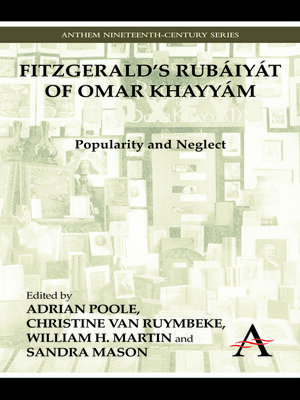FitzGerald's Rubáiyát of Omar Khayyám
ebook ∣ Popularity and Neglect · Anthem Nineteenth-Century
By Adrian Poole

Sign up to save your library
With an OverDrive account, you can save your favorite libraries for at-a-glance information about availability. Find out more about OverDrive accounts.
Find this title in Libby, the library reading app by OverDrive.



Search for a digital library with this title
Title found at these libraries:
| Library Name | Distance |
|---|---|
| Loading... |
Edward FitzGerald's 'Rubáiyát', loosely based on verses attributed to the eleventh-century Persian writer, Omar Khayyám, has become one of the most widely known poems in the world, republished virtually every year from 1879 to the present day, and translated into over eighty different languages. And yet it has been largely ignored or at best patronized by the academic establishment. This volume sets out to explore the reasons for both the popularity and the neglect.
|This volume of essays is based on a conference held in July 2009 at Trinity College, Cambridge to celebrate the bicentenary of the birth of Edward FitzGerald (1809) and the 150th anniversary of the first publication of his 'Rubáiyát of Omar Khayyám' (1859). The 'Rubáiyát', loosely based on the verses attributed to the eleventh-century Persian writer, Omar Khayyám, has become one of the most widely known poems in the world, republished virtually every year from 1879 (the year of FitzGerald's fourth edition) to the present day, and translated into over eighty different languages. And yet, with a few exceptions, it has been systematically ignored or at best patronized by the academic establishment. This volume sets out to explore the reasons for both the popularity and the neglect. Broadly speaking, the essays are divided into two main blocks. The first six chapters focus primarily on the poem's literary qualities (including consideration of its place in the tradition of verse translation into English, the idea of 'nothingness', and 'syntax and sexuality'), the last five on aspects of its reception (including essays on the late-Victorian Omar Khayyám Club, on American parodies, and on the many illustrated editions). They are linked by three essays that address key 'facilitators' in the poem's transmission (including the significant but neglected issue of cheap reprints).







